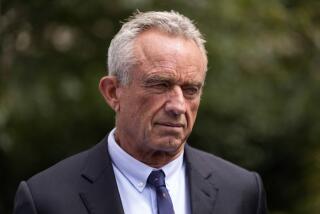Dukakis Won’t Seek 4th Term in Massachusetts
- Share via
WASHINGTON — Michael S. Dukakis announced Tuesday that he will not run again for governor of Massachusetts, triggering speculation that the former Democratic nominee might be considering a rematch for the presidency with George Bush.
At a press conference in Boston, Dukakis gave few hints about his plans. He said that his decision not to seek an unprecedented fourth term, made two years before his term expires, was “totally independent of another try at national office.” However, he said, he learned during the fall presidential campaign that it is “exceedingly difficult” to run for the White House as a sitting governor.
“I hope you don’t have to be unemployed to run for the presidency, or at least effectively unemployed,” he said.
Dukakis announced the decision first to his state cabinet members at a morning meeting, then to reporters at the hastily called press conference.
‘Never Say Never’
Asked repeatedly about his plans, Dukakis would go no further than to say “never say never.” Publicly, his close associates were taking the same line. “I just don’t know,” said Dukakis’ former campaign chief, John Sasso, when asked about the prospect of another presidential race. “I don’t think he knows,” Sasso added.
However, aides confirmed that Dukakis has talked to friends about the possibility of running again and several former campaign aides and Democratic strategists suggested Tuesday that the decision to forgo another Statehouse race could be the first step toward a second White House bid.
The lure of presidential races often proves strong for those who have tried and lost. One former candidate, Rep. Morris K. Udall (D-Ariz.) once quipped that the only known cure for the presidential fever “is embalming fluid.”
Several Strengths
As a potential presidential candidate for 1992, Dukakis would start with several strengths--name recognition, proven ability to raise funds and an organization in some key states. The idea of having a candidate who already has been exposed to the rigors of the race “is a good one, for all the obvious reasons,” Sasso said.
But Dukakis also would face a severe disadvantage: Many party activists, whose enthusiasm is critical for a successful presidential bid, hold him personally responsible for losing an election that many believed he could have won.
In the weeks immediately after the presidential vote, aides had talked about Dukakis being tired, dispirited and for the first time seemingly worn down by the pressures of his job, particularly a large and lingering state budget deficit. More recently, however, “it really seemed for the first time that the governor was back,” one state cabinet member said. Dukakis, he added, has been “showing a fair amount of feistiness and readiness to go out and fight.”
And fights he will have. Controversial new taxes may be required to ease the state budget deficit. The prospect appears to have spurred his decision not to seek another term as governor. “Given the challenges he faces, particularly the fiscal situation, he feels he can serve the state best without the question of his own political future on the horizon,” Sasso said.
In addition, with fellow Democrats eager to know whether they would have a clear field should they decide to run, “it seemed to me desirable to make the decision now, rather than later,” Dukakis said.
Numerous Democrats are expected to seek the governor’s job. On the outnumbered Republican side, Andrew Card Jr., a key Bush campaigner who will be serving as a senior deputy to John H. Sununu once Sununu becomes White House chief of staff, has been talking about making the race.
More to Read
Sign up for Essential California
The most important California stories and recommendations in your inbox every morning.
You may occasionally receive promotional content from the Los Angeles Times.














